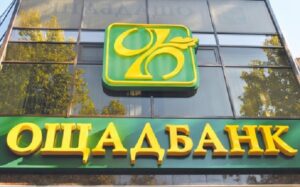
The state-owned Oschadbank (Kyiv) reported that, according to official statistics from the National Bank of Ukraine (NBU) as of January 1, 2026, it ranked first among Ukrainian banks in terms of net loan portfolio to legal entities.
“Oschadbank continues to hold the lead in business financing for the second year… At the beginning of 2026, we also ranked first in terms of total loan portfolio, providing businesses with financing of more than UAH 122 billion,” said Yuriy Katsion, Chairman of the Board of Oschadbank.
According to NBU statistics, Oschadbank’s net loan portfolio amounted to almost UAH 101.6 billion, which is 13% of the market, and grew by more than UAH 11.5 billion, or 12.9%, over the year. Separately, it is noted that the financial institution became the first in terms of the total volume of the loan portfolio of legal entities without accrued interest and deduction of reserves.
According to Oschadbank, 33% of the net loan portfolio is directed towards financing energy projects and providing energy resources, almost 25% towards the agro-industrial complex and food processing, and 8.4% towards supporting the country’s defense capabilities.
In addition, the volume of funds of legal entities attracted by the bank at the beginning of 2026 amounted to UAH 212 billion in equivalent (11% of the market) and almost UAH 180 billion (13%) in national currency. According to the bank, the business portfolio grew by more than UAH 49 billion over the year.
At the end of 2025, the corporate banking segment showed growth: the volume of business funds increased by 17.3% year-on-year, and lending by 30.1%.
According to the National Bank, as of early January 2026, Oschadbank, with total assets of UAH 514.7 billion (12.9% of the total), ranked second among 60 banks in Ukraine in terms of this indicator.

In its January inflation report, the National Bank of Ukraine increased its estimate for the grain and legume harvest in 2025 to 63.5 million tons from 61.5 million tons in its October report, while lowering its estimate for the oilseed harvest to 18.6 million tons from 19.3 million tons.
“The estimate for the oilseed harvest in 2025 has been revised downward by 0.7 million tons due to a slightly lower-than-expected soybean harvest and the inability to harvest part of the sunflower crop due to unfavorable weather conditions and the complex security situation in the regions where the crop is grown,” the document says.
This is the second such revision of estimates by the NBU: in last year’s July inflation report, it expected a grain harvest of 57.9 million tons and oilseeds of 21.0 million tons. In 2024, their harvest amounted to 56.2 million tons and 21.3 million tons, respectively.
The National Bank specified, with reference to data from the Ministry of Agrarian Policy, that as of the end of 2025, 89% of corn and 95% of grain and legume crops had been harvested. At the same time, thanks to significantly higher corn yields, the total harvest of grains and legumes exceeded the previous year’s figure: according to preliminary data from the Ministry of Agrarian Policy and Food, by 7.4% or 3% when compared with the final data from the State Statistics Service.
As for the 2026 harvest, the NBU maintained its forecast for grains at 62.9 million tons and lowered its forecast for oilseeds from 21.4 million tons to 20.9 million tons.
“In 2026–2027, the production volumes of grains and legumes (62.9 million tons and 63.5 million tons, respectively) will remain close to the current level and will grow more significantly in 2028 (65.0 million tons). Oilseed production will grow moderately in 2026–2028 (to 22 million tons at the end of the forecast period) amid a gradual improvement in productivity in the industry, but it will be held back by climate change in the southern regions, exacerbated by the destruction of the Kakhovka hydroelectric power plant, as well as security risks,” according to the National Bank.
At the same time, the NBU continues to assume that livestock farming will continue to make a negative contribution to the added value of agriculture due to the expected reduction in livestock numbers and pressure from production costs. However, this contribution will be less than previously expected due to the growth of poultry farming and the active recovery of pig farming after significant losses in 2024, according to the Inflation Report.
Despite the increase in harvest in 2025 compared to 2024, according to the Ministry of Agrarian Policy and Food, freight transportation for export in the fourth quarter of last year decreased by 23% y/y (compared to 34% y/y in the third quarter), primarily due to a further decline in maritime transport by 22% y/y (compared to 30% y/y in the third quarter).
As specified by the National Bank, rail transport decreased by 28% y/y (compared to 58% y/y in the third quarter), and road transport decreased by 42% y/y (compared to 53% y/y in the third quarter).
According to the State Statistics Service, the decline in freight turnover accelerated to 18% y/y on average in Q4 from 13% in Q3. Passenger turnover growth slowed to 0% y/y on average in Q4 (compared to an average growth of 7% in Q3).

In January 2026, the National Bank of Ukraine (NBU) reduced foreign exchange interventions by $14 million, or 0.4%, compared to January last year, to $3 billion 375.5 million, while the official hryvnia exchange rate depreciated against the dollar by 2.5%, or UAH 1.2.
At the same time, in the last week of January, the NBU reduced dollar sales on the interbank market by $202.1 million, or 19%, to $859.5 million.
According to the National Bank, in the first four days of last week, the average daily negative balance of buying and selling foreign currency by legal entities decreased to $95.5 million from $137.6 million in the same period a week earlier and totaled $381.8 million.
The negative balance in the market of foreign exchange transactions of households for Saturday-Thursday also decreased to $34.0 million from $36.4 million the week before last, with sales of non-cash currency exceeding purchases on all days.
The official hryvnia/dollar exchange rate, which started last week at 43.1391 UAH/$1, strengthened to 42.7689 UAH/$1 over three days and ended the week at 42.8483 UAH/$1.
In the cash market, the dollar’s exchange rate last week followed the trajectory of the official rate. In total, the dollar fell by about 27 kopecks during this period: buying – to 42.70 UAH/$1, selling – to 43.07 UAH/$1.
According to analysts of KYT Group, a major participant in the cash foreign exchange market (Liberty Finance LLC), the key event on the international market in the second half of January was the Fed meeting: the regulator, as expected by the markets, left the base rate unchanged, actually taking a break after three consecutive cuts in 2025.
Against this backdrop, the dollar weakened against the euro throughout the month (EUR/USD reached 1.2038, followed by a pullback), while US President Donald Trump’s rhetoric pushed investors to defensive assets, which supported the euro.
In the domestic market, analysts believe that the NBU will continue its policy of managed exchange rate flexibility, while at the same time expecting that the projected amount of foreign aid will be sufficient to finance the budget deficit without issuing new debt and maintain international reserves at a level sufficient to maintain the stability of the foreign exchange market. An additional factor for market expectations was the central bank’s decision to start an interest rate easing cycle and cut the key policy rate from 15.5% to 15% starting January 30, 2026.
According to KYT Group’s forecasts, in the next one to two weeks, the dollar will remain in the basic range of 42.9-43.4 UAH/$1 with the risk of fluctuations towards a weaker hryvnia, in the medium term of two to three months – 43.50-44.00 UAH/$1, while in the first half of 2026, the benchmark remains
43.5-44.9 UAH/$1.

The National Bank of Ukraine has expanded the scope of the license for direct insurance activities of Insurance Company Vostok-West LLC (Kiev) on the basis of the company’s application, the regulator said.
Thus, the company has obtained the right to carry out direct insurance under insurance class 13 “Insurance of other liability (except as defined in classes 10, 11, 12)” on the risk of insurance of liability to third parties, other than the liability of the operator of a nuclear installation for nuclear damage that may be caused as a result of a nuclear incident, with restrictions and features that give grounds for the application of a simplified approach for the calculation of solvency capital and minimum capital.
According to the information, the structure of the company’s insurance portfolio for the first nine months of 2025 by client component is as follows: 99% of insurance payments were received from policyholders – individuals, and from legal entities – 1%. Along with insurance of agricultural products (99%), property insurance remains the priority direction.
The volume of insurance premiums in the mentioned period has amounted to UAH 12,838 mln, insurance reserves – UAH 9,649 mln. The volume of insurance indemnities for the nine months of 2025 compared to the same period of 2024 has increased by 40%.
IC “Vostok-West” has been working in the insurance market of Ukraine since 2005.

The National Bank of Ukraine (NBU) increased dollar sales on the interbank market by $79.0 million, or 12.5%, to $712.1 million last week, according to statistics on the regulator’s website.
According to the NBU, during the first four days of last week, the average daily negative balance of currency purchases and sales by legal entities decreased to $67.3 million from $69.3 million during the same period a week earlier, totaling $269.3 million.
On the currency exchange market for the population, on the contrary, the negative balance increased to $46.5 million from $21.9 million the week before last, and on all days, the purchase of non-cash currency exceeded its sale.
The official hryvnia-to-dollar exchange rate, which started last week at 42.2942 UAH/USD, weakened daily to a new historic low, broke through the 43 UAH/USD level, and ended the week at 43.0757 UAH/USD.
The hryvnia’s exchange rate against the euro also fell by 1.1% over the week, from 49.5794 UAH/EUR1 to 50.1444 UAH/EUR1. During these days, it also broke through the important level of 50 UAH/EUR1 for the first time and reached a historic low of 50.1762/EUR1.
On the cash market, the dollar exchange rate over the past week followed the official trajectory, with the dollar rising by approximately 77 kopecks over the week: purchase – to 42.84 UAH/$1, sale – to 43.26 UAH/$1, while on the black market on Monday it reached 43.4-43.5 UAH/$1, with the euro also rising in price by 80 kopecks and currently trading at: purchase – 50 UAH/EUR11, sale – 50.73 UAH/EUR1.

The National Bank of Ukraine fined FC Axioma LLC UAH 200,000 for violating currency legislation.
The violations concerned the timing of providing fragments of video archive data at the request of the NBU. A similar fine of UAH 200,000 was imposed on FC Centrofinance LLC for failure to comply with the requirements for equipping a separate unit with a video surveillance system for currency transactions.
Axioma, Centrofinance, FC, FINE, NBU